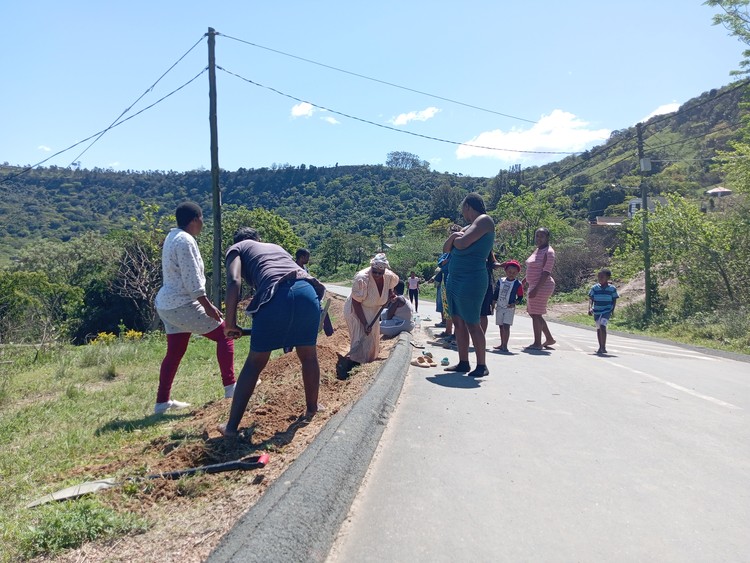Women dig their own pipeline after years of frustration with eThekwini water supply
Many families in Matikwe north of Durban were left out when pipes were installed
A group of Matikwe residents, mostly women, are digging their own trench to lay pipes to connect their yards to the water supply. Photo: Tsoanelo Sefoloko
- In Matikwe, in Inanda north of Durban, some 100 households were left out when water taps were installed in yards years ago.
- The families have to get water from a spring, or from other households who do have water, or from water tankers which come irregularly.
- Now a group of residents, mostly women, are digging their own pipeline to the water supply.
Women in Matikwe north of Durban are digging a trench to lay their own pipeline after years of frustration with the eThekwini municipal water supply.
About 100 households in Matikwe do not have standpipes in their yards. They say they have been waiting for 18 years to be connected to the water supply. Some families get water from a nearby spring, others fetch it from households some 500m away who do have taps. Elderly people who cannot fetch their own water pay someone R10 to carry 20 litres of eater for them. Municipal water tankers do come but not regularly, they say.
Residents say every ward councilor who needs their vote always promises them taps in their yards. But the promises are never kept.
Now they are worried that in view of announcements by the mayor of eThekwini last week about water curtailment, their chances of being connected to the mains are even lower. Mayor Cyril Xaba said at a media briefing on 3 October that the volume of water from the uMngeni-uThukela Water Catchment System, from which the city gets most of its water, was to be gradually reduced to July 2023 levels. Xaba said demand for water in eThekwini far outstripped supply.
When GroundUp visited Matikwe, a group of women and one man were digging a trench to connect the yards in their area to the pipeline 100 metres away. They said other people who had connected water illegally now had water in their yards.
There is a communal standpipe, but it is dry and overgrown with grass. Residents say it has not worked for years.
Community leader Ntombehle Gabela said the families had been left out when taps were being installed nearby. “I was born in this area and grew up here. We would be happy if they at least fixed the standpipe that was damaged about ten years ago. Every time we report it they tell us that they’re going to fix it but they don’t.”
The head of water and sanitation in eThekwini municipality, Ednick Msweli, said his department would investigate and try to assist with water tankers. He urged residents to inform their ward councillor when there were problems with water so that water tankers could be arranged. But residents said the councillor, Mpilo Mkhize, was never available. They said he had not been in the area since the local elections. GroundUp tried to reach Mkhize for comment several times but was unsuccessful.
“We would like to urge the community members not to connect their pipe into the main pipe because maybe one of the reasons why the water was not connected into their yard is because of the pressure of water in those main pipes,” said Msweli.
Resident Dumile Gabela said “We have decided to come together as residents to install water. Most of us are females, but we have no choice. We are suffering. We are the ones who need water more.”
Gabela said they had been digging their trench for more than a week. “Now we are hopeful that we will be able to get water from the main pipe,” she said.
EThekwini municipality spokesperson Gugu Sisilana said the municipality was deploying water tankers to the affected areas and urged residents to provide their ward councilor with specific details of their water challenges including street names.
Support independent journalism
Donate using Payfast

Don't miss out on the latest news
We respect your privacy, and promise we won't spam you.
Next: Vital water project halted because municipality failed to pay contractors
Previous: Heroin use has spread as prices plummet
© 2024 GroundUp. This article is licensed under a Creative Commons Attribution-NoDerivatives 4.0 International License.
You may republish this article, so long as you credit the authors and GroundUp, and do not change the text. Please include a link back to the original article.
We put an invisible pixel in the article so that we can count traffic to republishers. All analytics tools are solely on our servers. We do not give our logs to any third party. Logs are deleted after two weeks. We do not use any IP address identifying information except to count regional traffic. We are solely interested in counting hits, not tracking users. If you republish, please do not delete the invisible pixel.

